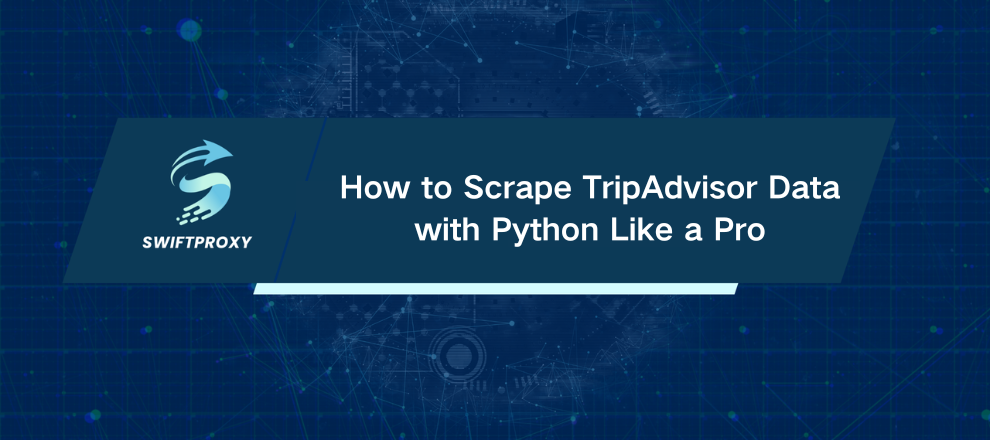How to Scrape TripAdvisor Data with Python Like a Pro

TripAdvisor hosts millions of user reviews — hotels, restaurants, experiences — a goldmine for anyone serious about travel analysis or competitor intelligence. Imagine tapping into that wealth of insights automatically, in real-time, and turning raw reviews into actionable data. Sounds powerful, right? It is. And you don't need to be a coding wizard to do it.
In this guide, we'll walk you through a clean, straightforward Python scraper that extracts rich TripAdvisor data and saves it in CSV format for your analysis. No fluff. Just the tools, techniques, and code you need to dive deep.
Install Your Tools
We'll build this scraper with two Python heavy-hitters:
requests — to fetch webpage content
lxml — to parse and extract data with precision using XPath
Fire up your terminal and run:
pip install requests lxml
Simple. Done.
Headers and Proxies
Websites guard their data fiercely. TripAdvisor is no exception. To stay under the radar:
Set your request headers carefully. Mimic real browsers with a solid User-Agent string to avoid immediate blocking.
Use proxies. Rotate IP addresses to dodge rate limits and IP bans. This is crucial for scraping at scale.
Pairing reliable headers with proxies creates a double layer that helps your scraper run more smoothly and last longer.
Import and Define Your Targets
Start by importing libraries and listing your target URLs — the hotel pages you want to scrape.
import requests
from lxml.html import fromstring
import csv
urls_list = [
'https://www.tripadvisor.com/Hotel_1_URL',
'https://www.tripadvisor.com/Hotel_2_URL'
]
Keep your URL list handy and expandable.
Craft Your Headers
Here's a robust headers dictionary that mimics a legit browser session perfectly:
headers = {
'accept': 'text/html,application/xhtml+xml,application/xml;q=0.9,image/avif,image/webp,image/apng,*/*;q=0.8',
'accept-language': 'en-US,en;q=0.9',
'cache-control': 'no-cache',
'pragma': 'no-cache',
'user-agent': 'Mozilla/5.0 (X11; Linux x86_64) AppleWebKit/537.36 (KHTML, like Gecko) Chrome/130.0.0.0 Safari/537.36',
}
This setup sends the right signals so TripAdvisor treats your request like a genuine browser visit.
Keep Your IP Fresh with Proxies
Add your proxy details here:
proxies = {
'http': 'http://your_proxy_address:port',
'https': 'http://your_proxy_address:port',
}
Replace 'your_proxy_address:port' with your actual proxy provider info. Rotate proxies regularly to avoid getting blocked.
Fetch, Parse, Extract
Loop through your URLs, request each page, parse the HTML, then extract data with XPath selectors:
extracted_data = []
for url in urls_list:
response = requests.get(url, headers=headers, proxies=proxies)
parser = fromstring(response.text)
title = parser.xpath('//h1[@data-automation="mainH1"]/text()')[0]
about = parser.xpath('//div[@class="_T FKffI bmUTE"]/div/div/text()')[0].strip()
images_url = parser.xpath('//div[@data-testid="media_window_test"]/div/div/button/picture/source/@srcset')
price = parser.xpath('//div[@data-automation="commerce_module_visible_price"]/text()')[0]
ratings = parser.xpath('//div[@class="jVDab W f u w GOdjs"]/@aria-label')[0].split(' ')[0]
features = parser.xpath('//div[@class="f Q2 _Y tyUdl"]/div[2]/span/span/span/text()')
reviews = parser.xpath('//span[@class="JguWG"]/span//text()')
listing_by = parser.xpath('//div[@class="biGQs _P pZUbB KxBGd"]/text()')[0]
similar_experiences = parser.xpath('//div[@data-automation="shelfCard"]/a/@href')
data = {
'title': title,
'about': about,
'price': price,
'listing_by': listing_by,
'ratings': ratings,
'image_urls': images_url,
'features': features,
'reviews': reviews,
'similar_experiences': similar_experiences
}
extracted_data.append(data)
Notice how each XPath targets specific, meaningful data points. This is precision scraping.
Save Your Harvest and Export to CSV
Finally, let's store your treasure trove into a CSV file — easy to open, analyze, and share.
csv_columns = ['title', 'about', 'price', 'listing_by', 'ratings', 'image_urls', 'features', 'reviews', 'similar_experiences']
with open("tripadvisor_data.csv", 'w', newline='', encoding='utf-8') as csvfile:
writer = csv.DictWriter(csvfile, fieldnames=csv_columns)
writer.writeheader()
for data in extracted_data:
writer.writerow(data)
print('Data saved successfully to tripadvisor_data.csv')
You now have clean, structured TripAdvisor data at your fingertips.
Why Scraper Matters
With this scraper, you're not just pulling data — you're unlocking insights:
Market Trends: See which hotels shine and why.
Consumer Sentiment: Analyze reviews to understand traveler moods.
Competitive Edge: Monitor your rivals effortlessly.
Strategic Decisions: Back your moves with data, not guesses.
Master this technique, and you open doors to powerful, data-driven decisions in travel, hospitality, and beyond.
Final Thoughts
The scraper does more than gather information. It provides a clear window into traveler behavior and market dynamics. With accurate, up-to-date TripAdvisor data at your disposal, you can make informed decisions that boost your competitive position and improve customer experience. Harness the power of data-driven insights to lead with confidence in the ever-evolving travel industry.

















































